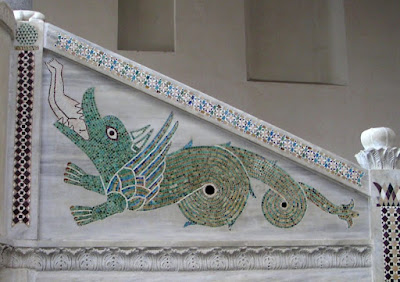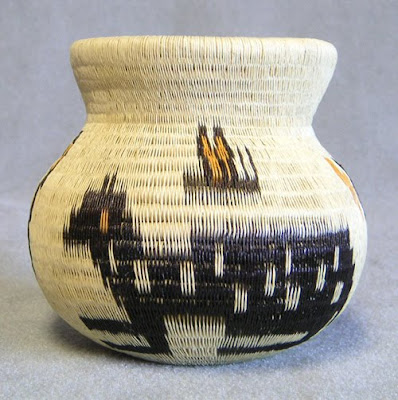Sunday, May 30, 2010
Saturday, May 29, 2010
Friday, May 28, 2010
A Crab in the Aisle
You'll find this crab and gryphon among other images from the zodiac in the aisle leading to the high altar in St-Denis Basilica near Paris. I was surprised to see signs of the zodiac inside a church, but I should not have been. You can read more about the convention here.

Thursday, May 27, 2010
Wednesday, May 26, 2010
Chowder, Anyone?
San Francisco International Airport
Don't do this to me. Has someone figured out that you sell more seafood if the fish have happy smiles on their faces?
Elephantopiary
San Diego Zoo
I probably should have gone up to see what his tusks were made of and how they were attached, but after a long day of walking around (long, but enjoyable), I didn't think of it. I was happily surprised to see the elephant waving goodbye to us with his trunk. (In my own mind; no, the trunk didn't move, even in California.)
Tuesday, May 25, 2010
A Viking Dragon?
This looks to me like a dragon's head, possibly Viking-era in style, although I really don't know what it is. We found it while walking along The High Street on a rainy day, and I'm guessing its function is for scraping mud off your boots before you enter the halls of learning.
Monday, May 24, 2010
Moo
Portland International Airport
 I hope there's something edible in that bucket. This cow looks hungry.
I hope there's something edible in that bucket. This cow looks hungry.Sunday, May 23, 2010
Saturday, May 22, 2010
Wednesday, May 19, 2010
Pretty Birds
Colorful birds on a U.S. postage stamp
commemorating John James Audubon ~
2002
Tuesday, May 18, 2010
Monday, May 17, 2010
Fish and Shell Mosaic in the Women's Bathroom
I found this mosaic in a restroom at one of the Portland convention centers. I think it was the Rose Garden, but I'm no longer sure about that. We had attended a gift show before I had any clue about finding my way around Portland. I only remember I was happy to see that someone had thought of decorating the restroom with animals.
Sunday, May 16, 2010
An Egret at Maryhill
Down the slope is the Columbia River. On the other side are miles and miles of arid, rocky terrain. Yet inside the Maryhill Museum of Art you'll find world-class exhibits of European origin. Sam Hill wanted his wife to forget about her life in Minneapolis and be content with him here in the West. It didn't work out, but he left an unusually interesting legacy and many miles of good roads. And this bronze egret.
Saturday, May 15, 2010
Friday, May 14, 2010
Scarlet Kingsnake on a US Postage Stamp
 Scarlet Kingsnake (Lampropeltis elapsoides)
Scarlet Kingsnake (Lampropeltis elapsoides) South-eastern United States
U.S. Postage Stamp ~ 2003
Postage stamps are often such wonderful pieces of mini art. I've saved them for years. I don't sort and organize them, and I know nothing about stamp collecting. I always grab the cool animal stamps I see, and a few other other images, too. I use them in collages or I just keep them in a jar. Now I have another use for them . . . on this blog.
Thursday, May 13, 2010
Extinct Cat Sculpture at the San Diego Zoo
It seems that zoos display more and more animals that aren't alive and aren't in cages. I'm not sure when zoo sculpture began to be popular, but my most recent trips to zoos have turned up quite a lot of it besides the typical oversized animal sculpture outside the zoo's front entrance. I like the trend. This extinct cat, however, is designed more for instruction (I think) than as art. It was in an area that also had a replica of a prehistoric horse's skull embedded in the earth and a demonstration of the La Brea Tar Pits, both seen here on one of my other blogs. I should have looked for a plaque explaining more about the cat, but this photo is all I have.
Wednesday, May 12, 2010
The Amazing Salmon Bench
Friday, May 7, 2010
Man-eating Monster, Ravello
Here is a remarkable piece of Byzantine mosaic on a pulpit inside the church on the Piazza Vescovado, the main square of Ravello. The church was built in the 11th Century and renovated in 1786. Follow this link to see previous posts featuring this church.
Thursday, May 6, 2010
A Cow in the Forest
This post stands at the entrance to a ranch or estate, but I don't remember what function the post had, if any. This is the only photo I took of it, focusing in on the cow. A friend and I had just been driving around the peninsula, exploring new territory, as we'd both arrived in Astoria over the summer. Nearby were beef cows grazing in the rain in small meadow patches between the pines. Lichens clung to everything. The old, unusued buildings here were falling apart from the wet climate rather than the dry. It was all new experience.
Wednesday, May 5, 2010
Tuesday, May 4, 2010
Deer and Butterfly on a Wovern Water Jar Made in Colombia
Werregue Basket, Made in Colombia
Due to the unique construction methods used for werregue baskets, it takes several days to several months for an artisan to make each basket. Each is a work of art in itself, and no two are alike. Made from the spines of werregue palm trees, the baskets are lined internally so they hold water. The baskets are used by the local people to carry water from the rivers and lakes into the village. Inside and out, the baskets look like they're completely made of woven palm; the secret water shield is buried among the layers of the basket. Because of this, it is heavier than you would expect a basket to be. The palm fibers are also dense and slick, adding to the solid feel of these specially crafted pieces.Werregue baskets are considered to be the finest baskets made in Colombia. Their craftsmanship, detail, and the tight weaving of the fibers are easy to appreciate. They are extremely beautiful and also durable. Beneath the top layers of fiber you can see the tight coils used to shape the baskets. They are coiled tigher and of smaller diameter at the bottom of the basket. They grow as the basket widens out and they narrow again at the narrowest part of the neck below the rim.
Monday, May 3, 2010
Toucan on a Woven Water Jar Made in Colombia
Werregue Basket, Made in Colombia
Due to the unique construction methods used for werregue baskets, it takes several days to several months for an artisan to make each basket. Each is a work of art in itself, and no two are alike. Made from the spines of werregue palm trees, the baskets are lined internally so they hold water. The baskets are used by the local people to carry water from the rivers and lakes into the village. Inside and out, the baskets look like they're completely made of woven palm; the secret water shield is buried among the layers of the basket. Because of this, it is heavier than you would expect a basket to be. The palm fibers are also dense and slick, adding to the solid feel of these specially crafted pieces.Werregue baskets are considered to be the finest baskets made in Colombia. Their craftsmanship, detail, and the tight weaving of the fibers are easy to appreciate. They are extremely beautiful and also durable. Beneath the top layers of fiber you can see the tight coils used to shape the baskets. They are coiled tigher and of smaller diameter at the bottom of the basket. They grow as the basket widens out and they narrow again at the narrowest part of the neck below the rim.
Sunday, May 2, 2010
Orangutan Sculpture
Labels:
2008,
bronze,
orangutan,
sculpture,
seattle,
washington,
woodland park zoo,
zoos
Saturday, May 1, 2010
Animal Art on a Victorian Facade
This eel, snake, and dog- or wolf-like animal are some of the many sculptures and reliefs on the facade of the magnificent Victorian-era Natural History Museum in London.
Subscribe to:
Comments (Atom)























